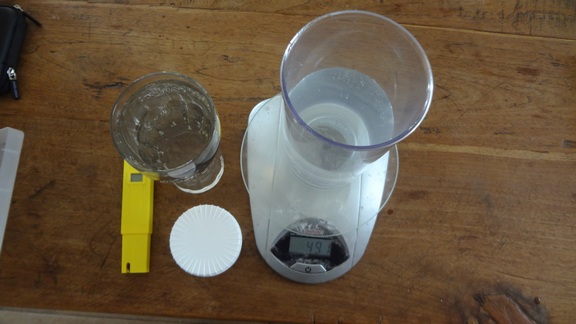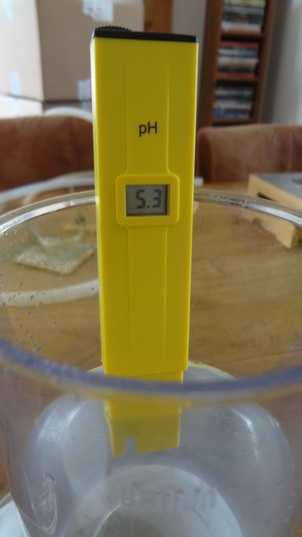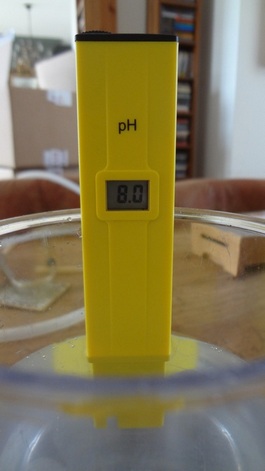According to me beer making is not a very exact science for hobby brewers. It does not matter if you use a little too much malt or maybe even a different kind of hop. It will become beer.
So far I did not care at all about the pH of the water that I use. In the last beer that I brewed I decided to add some citric acid to the water as a test. To my surprise I ended up with a higher gravity than the previous time I made the same beer. Apparently the enzymes do work better at a lower pH.
Luckily a friend of mine has a very cheap pH meter that he bought from China so I borrowed it and did a test with it. According to a book I have, the enzymes work best at a pH between 5,2 and 5,6 so that was the target.

Testing equipment
The pH is not a linear scale so it is not so easy to predict the result. So I just tried to reach it.
Normally beer makers use lactic acid or other acids but since I don’t have it I decided to use citric acid which is a nice fresh tasting acid.
First I took a measurement of the water that I use without any additions. The pH is 8,0.
Then I added 1 gram citric acid to 0,5 litre water. The pH went down to 2,8.
Obviously this was way too low so I diluted the solution by throwing away half of it and then add the same volume of water. The result was
1 gm in 1 litre -> pH 3,2
1 gm in 2 litre -> pH 3,8
1 gm in 4 litre -> pH 4,8
1 gm in 8 litre -> pH 6,1
Since my scale is not very accurate the above test is just an indication. I decided to use bigger quantities to be more accurate. I dissolved 10 gm citric acid in 500 mL water. Of this solution I used 5 mL. (Containing 0,1 gm acid)
Then I dissolved this 5 mL (0,1 gm) in 500 mL water. The pH measured 5,3.

perfect!
So in conclusion; if you want to make 10 L beer you should add about 2 gm of citric acid. This is so little that obviously you are not going to taste this in the finished beer.
Calcium Chloride and pH
In this last beer I also used Calcium Chloride to soften the water. I am not able to do any measurements of the hardness so I used 2 gm per 15 L as per the recipe. (Actually I use 6 mL of the 30% CaCl solution which I use for cheese making)
I read somewhere on the web that CaCl also decreases the pH so I decided to test that as well.
First I measured the CaCl solution as is. The pH is 5,9. Not very low, so I assumed that it would not be a great influence.
And I was right. I dissolved 30 ml (=10gm CaCl) in 1 litre water. The pH went from 8,0 to 7,6
Then I added another litre water. 10 gm CaCl in 2 litres of water. The pH went from 8,0 to 7,8.
It is safe to say that CaCl additions do not have influence on the pH compared to citric acid additions.
Hans


